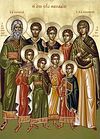

| Previous day | Next day |
| Old Style
August 1
|
Saturday |
New Style
August 14
|
|
8th Week after Pentecost.
Tone 6.
Начало Успенского поста. |
Wine and oil allowed.
|
![]() Procession of the Precious Wood of the Life-giving Cross of the Lord.
Procession of the Precious Wood of the Life-giving Cross of the Lord. ![]() Feast of the All-Merciful Savior and the Most Holy Theotokos (commemoration of the victory of St. Andrew Bogolubsky over the Volga Bulgars) (1164).
Feast of the All-Merciful Savior and the Most Holy Theotokos (commemoration of the victory of St. Andrew Bogolubsky over the Volga Bulgars) (1164). ![]() Holy Seven Maccabees: Martyrs Abimus, Antonius, Gurias, Eleazar, Eusebonus, Alimus, and Marcellus, their mother Solomonia, and their teacher Eleazar (166 b.c.).
Holy Seven Maccabees: Martyrs Abimus, Antonius, Gurias, Eleazar, Eusebonus, Alimus, and Marcellus, their mother Solomonia, and their teacher Eleazar (166 b.c.).
Nine Martyrs of Perge in Pamphylia: Leontius, Attius, Alexander, Cindeus, Minsitheus (Mnesitheus), Cyriacus, Mineon (Menaeus), Catanus, and Eucleus (3rd c.). Uncovering of the relics (1995) of St. Sophia of Suzdal, nun (in the world Solomonia)(1542), wife of Grand Duke Basil III of Moscow (1995). St. Nicholas, Equal-to-the-Apostles, enlightener of Japan (1912).
New Hieromartyr Dimitry Pavsky, archpriest, of Ulyanovo (Tver) (1937).
St. Eusebius, bishop of Verceil (Italy) (ca. 371). Martyr Elessa of Cythera (375). Sts. Friardus of Vindumitta (573) and Secundellus, deacon (6th c.), of Gaul. St. Timothy the Wonderworker, bishop of Proconnesus (6th c.). St. Cennydd (Kenneth), monk, of Llangenydd (Wales) (6th. c.). St. Ethelwold, bishop of Winchester (984).
Repose of Abbess Alexia of Nizhni-Novgorod (1940).
Thoughts for Each Day of the Year
According to the Daily Church Readings from the Word of God
By St. Theophan the Recluse

Friday. [I Cor. 11:8-22; Matt. 17:10-18]
Concerning John the Baptist the Lord said: Elias is come already, and they knew him not. Why was this? Because they did not heed the paths of God and were not interested in them: they had a different mentality, different tastes, different views on things. Outside the range of Divine things, their shrewdness was in play, but within this range they did not understand anything due to their estrangement from it. One’s inner mentality forms a feeling for things, which immediately notices and determines what is familiar to it, no matter how concealed it may be. An artist, scientist and economist look at one thing with equal attention, but each makes a judgment about it in his own way—one according to its beauty, the second according to causal relations, the third according to gains from it. So with the Jews: as was their disposition, so they judged about John, and then about the Saviour; but since they were disposed not according to God, they did not understand them, who carried out the work of God. Similarly, now people have begun to not understand the Forerunner and the Lord—and do with them what they like. A hidden persecution of Christianity has arisen, which has begun to openly break through, like recently in Paris. What was done there on a small scale, is what we must expect with time in big proportions…Save us, O Lord!
Saturday. [Rom. 13:1-10; Matt. 12:30-37]
A good man out of the good treasure of the heart bringeth forth good things: and an evil man out of the evil treasure bringeth forth evil things. What you put in the treasury is what you receive: if you put in gold—you will take away gold; if you put in copper—you will take away copper. Of course, copper can be passed off as gold; but an expert will immediately recognize the forgery. How can we make it so that in our treasury there is only gold; that is, so that in the heart there is only good? The heart by its nature is a treasury of good things; evil came later. Take an anatomical knife of attentiveness and lack of self pity, separate what is unnatural and cut it out. One after the other the evil will leave, while the good will become strengthened and spread; what will remain, at last, will be only good. The question is how to determine what is natural and unnatural. Do not listen to today’s naturalists;[1] they explain everything inside out: what is natural, for them is unnatural; while what is unnatural, for them is natural—they call evil good, and good evil. Look at what the Lord says in the Gospels and the holy apostles in their writings, and according to their instructions determine what is natural. In such a manner, at last, you will gather much good and will bring it forth out of your heart. Pray to the Holy Spirit: “O treasury of good things, entreasure good in my heart!”
[1]By “naturalists” is meant those people who rely on natural science for answers, and deny religion.








